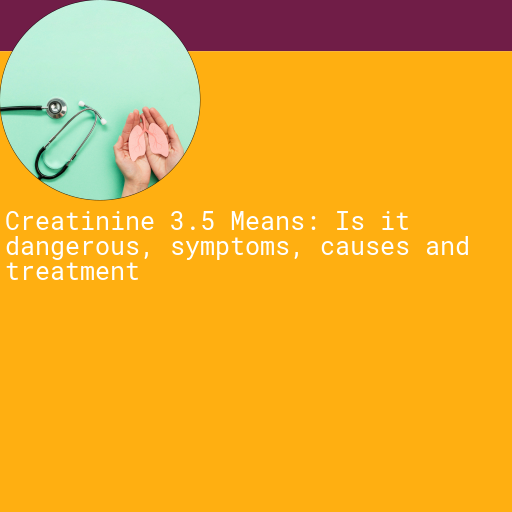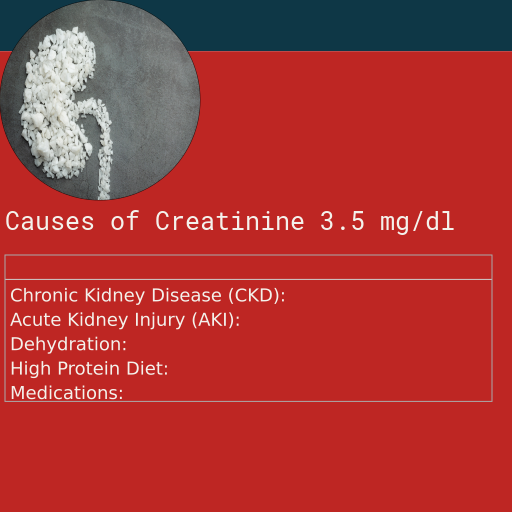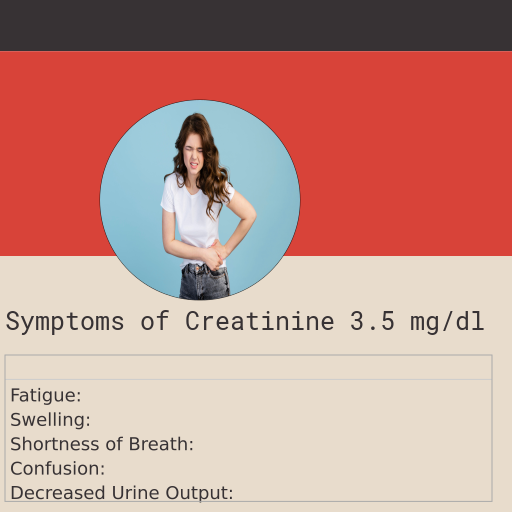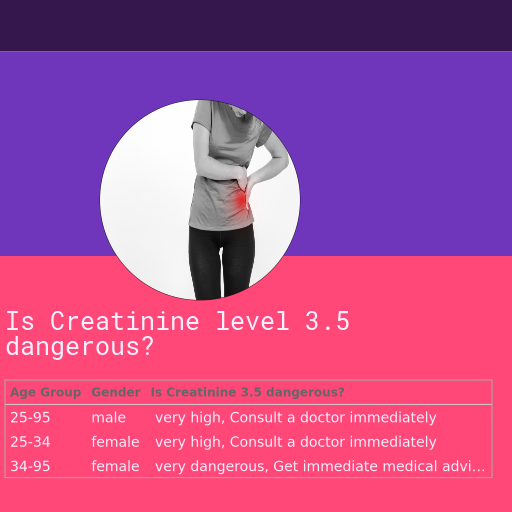Creatinine 3.5 : Is it Dangerous, Causes, Symptoms and More
When it comes to understanding your health, being aware of your creatinine levels is crucial. Creatinine is a waste product produced by muscles from the breakdown of a compound called creatine. It's typically filtered out of the blood by the kidneys and excreted in urine. However, when creatinine levels rise to 3.5, it can be a sign of serious health issues. This blog will delve into the dangers of elevated creatinine levels, explore the various causes behind this condition, and help you recognize the symptoms that might indicate a problem, along with discussing possible treatment options to manage and reduce these levels effectively.

What is Creatinine
Creatinine is a byproduct of protein breakdown that primarily comes from muscle metabolism. As a waste product, it serves no useful purpose in the body and is typically filtered out by the kidneys. Elevated levels of creatinine in the blood can indicate that the kidneys are not functioning properly, as they are not effectively removing this waste. Understanding the role of creatinine is crucial for recognizing potential signs of kidney issues and addressing them promptly.
- Dietary Meat: Consuming large quantities of red meat and other animal proteins can increase creatinine levels.
- Muscle Breakdown: High-intensity exercise or muscle injury can lead to increased production of creatinine.
- Kidney Function: Impaired kidney function can cause creatinine to accumulate in the blood, as the kidneys are responsible for filtering it out.
- Medications: Certain medications, such as nonsteroidal anti-inflammatory drugs (NSAIDs) and some antibiotics, can affect creatinine levels.
- Supplements: Some dietary supplements, particularly those containing creatine, can raise creatinine levels.
- Dehydration: Lack of sufficient fluids can lead to higher concentrations of creatinine in the blood.
- Chronic Diseases: Conditions like diabetes and hypertension can affect kidney function and, consequently, creatinine levels.
Normal Range of Creatinine in Adults
In adults, the normal range of creatinine levels can vary depending on factors such as age, sex, and muscle mass. Generally, for adult males, the normal range is approximately 0.6 to 1.2 milligrams per deciliter (mg/dL), while for adult females, it is about 0.5 to 1.1 mg/dL. These values can help gauge the efficiency of the kidneys in filtering waste from the blood. Elevated levels, such as a creatinine reading of 3.5 mg/dL, can indicate potential kidney issues and may warrant further medical evaluation.
| Age Group | Normal Creatinine Range (mg/dL) |
|---|---|
| Infants (0-1 year) | 0.2 - 0.4 |
| Children (1-12 years) | 0.3 - 0.7 |
| Adolescents (13-18 years) | 0.5 - 1.0 |
| Adults (Male) | 0.6 - 1.2 |
| Adults (Female) | 0.5 - 1.1 |
| Elderly (60+ years) | 0.5 - 1.2 |
Causes of Creatinine 3.5
Elevated creatinine levels can be a cause for concern, indicating potential issues with kidney function. Various factors can contribute to an increase in creatinine, including chronic kidney disease, dehydration, and high protein diets. Other causes might include medications that affect kidney performance, such as certain antibiotics and nonsteroidal anti-inflammatory drugs (NSAIDs). Understanding these causes is crucial for determining the appropriate treatment and management strategies to protect kidney health.
- Chronic Kidney Disease (CKD): A progressive condition where the kidneys lose function over time.
- Acute Kidney Injury (AKI): A sudden episode of kidney failure or damage that happens within a few hours or days.
- Dehydration: Lack of sufficient fluid intake can lead to reduced kidney function, causing creatinine levels to rise.
- High Protein Diet: Consuming excessive protein can increase creatinine production as the body breaks down muscle tissue.
- Medications: Certain drugs like NSAIDs, ACE inhibitors, and some antibiotics can elevate creatinine levels.
- Intense Exercise: Strenuous physical activity can lead to muscle breakdown, increasing creatinine production.
- Diabetes: Poorly managed diabetes can damage the kidneys, leading to elevated creatinine levels.
- High Blood Pressure: Hypertension can damage the kidneys over time, resulting in increased creatinine levels.

Symptoms of Creatinine 3.5
When it comes to understanding the implications of elevated creatinine levels, recognizing the symptoms is crucial. Elevated creatinine may not always manifest obvious signs initially, but as levels increase, individuals may experience a range of symptoms. Common symptoms include fatigue, swelling in the extremities, shortness of breath, and changes in urine output. It's important to note that these symptoms can often be subtle, making regular monitoring of kidney function essential for those at risk.
- Fatigue: Persistent tiredness and lack of energy can be a symptom of elevated creatinine levels.
- Swelling: Edema, or swelling in the face, hands, and feet, can occur due to kidney dysfunction.
- Shortness of Breath: Difficulty breathing can be a sign that your kidneys are not filtering waste effectively.
- Confusion: Mental fog or confusion can result from the buildup of toxins in the blood.
- Decreased Urine Output: Producing less urine than usual can indicate a problem with kidney function.
- High Blood Pressure: Elevated blood pressure can be both a cause and an effect of kidney issues.
- Nausea and Vomiting: Feeling nauseous or vomiting can be associated with high creatinine levels.
- Muscle Cramps: Muscle pain or cramps can occur when waste products accumulate in the body.

Dangers of Creatinine 3.5
Creatinine, a waste product produced by muscles, is normally filtered out by the kidneys and excreted in urine. While creatinine itself does not directly harm the body, its elevated levels can indicate serious underlying health problems. High creatinine levels are often a sign of kidney failure or other renal issues, pointing to the kidneys' reduced ability to filter waste effectively. This inefficiency can lead to the accumulation of other harmful waste products like urea, which can cause significant damage to various body systems if not properly managed.
- Kidneys: Elevated creatinine levels can indicate impaired kidney function, which may lead to chronic kidney disease or kidney failure.
- Heart: High creatinine levels are often associated with an increased risk of cardiovascular diseases, including heart attack and stroke.
- Liver: Although less common, elevated creatinine can also signal potential liver dysfunction, which may lead to liver disease.
- Muscles: High creatinine can be a sign of muscle breakdown or damage, potentially leading to conditions like rhabdomyolysis.
- Brain: Elevated creatinine levels may contribute to cognitive impairment and increase the risk of encephalopathy, a condition that affects brain function.
- Lungs: Kidney dysfunction associated with high creatinine can lead to fluid retention in the lungs, causing pulmonary edema and breathing difficulties.
- Digestive System: Impaired kidney function can result in gastrointestinal issues such as nausea, vomiting, and loss of appetite due to toxin build-up in the body.
- Blood Pressure: Elevated creatinine levels can be linked to hypertension, which further strains the kidneys and cardiovascular system, creating a vicious cycle of health issues.
Home remedies for Creatinine 3.5
Disclaimer: Elevated creatinine levels should not be treated at home without medical supervision. It is imperative to consult with a healthcare professional to determine the underlying cause and appropriate treatment. Basic supportive care involves maintaining adequate hydration, following a renal-friendly diet, and avoiding nephrotoxic medications. However, these measures are not substitutes for professional medical advice and intervention. Always seek guidance from your doctor to manage your condition effectively and safely.
- Stay Hydrated: Ensure you drink plenty of water throughout the day. Proper hydration helps the kidneys flush out toxins and can aid in reducing creatinine levels.
- Maintain a Balanced Diet: Focus on a diet that is low in protein, potassium, and phosphorus. Eating more fruits and vegetables while limiting red meat and dairy can be beneficial.
- Avoid Over-the-Counter Medications: Some common medications, like nonsteroidal anti-inflammatory drugs (NSAIDs), can be harmful to the kidneys. Consult your healthcare provider before taking any new medications.
- Regular Exercise: Engage in moderate physical activity like walking or swimming. Exercise can improve overall health and help maintain kidney function, but avoid overexertion which can increase creatinine levels.
- Monitor Blood Pressure and Blood Sugar: Keep an eye on your blood pressure and blood sugar levels. High blood pressure and diabetes are leading causes of kidney damage, so managing these conditions is crucial.
Treatment for Creatinine 3.5
Medical treatment by a doctor is crucial when dealing with a creatinine level of 3.5. The primary treatment goals include stabilizing kidney function, which may involve medications or dietary changes to support the kidneys. Another key objective is stopping harmful drugs that could be contributing to the elevated creatinine levels. Additionally, addressing and treating any infections that may be impacting kidney health is essential. These interventions are aimed at preventing further kidney damage and promoting overall renal health.
- Medications: Doctors may prescribe medications to manage the underlying conditions contributing to elevated creatinine levels, such as high blood pressure or diabetes.
- Dietary Changes: Reducing protein intake and limiting foods high in potassium and phosphorus can help manage creatinine levels. Consulting a dietitian for a renal-friendly diet is often recommended.
- Hydration: Staying well-hydrated is crucial, as dehydration can lead to elevated creatinine levels. Drinking adequate amounts of water can help improve kidney function.
- Dialysis: In severe cases where kidney function is significantly impaired, dialysis may be necessary to remove waste products from the blood, including creatinine.
- Lifestyle Modifications: Regular exercise, avoiding smoking, and limiting alcohol intake can improve overall health and support kidney function. Stress management techniques such as yoga and meditation may also be beneficial.
GFR with Creatinine of 3.5
When discussing kidney health, it's crucial to understand the concept of Glomerular Filtration Rate (GFR). The GFR is a measure of how well your kidneys are filtering blood, giving a more comprehensive picture of kidney function than just the absolute value of creatinine alone. While a creatinine level of 3.5 might raise alarms, it is the GFR that truly determines the severity of kidney impairment. A high creatinine level can mean many things and varies based on factors like age, sex, muscle mass, and hydration levels. Conversely, the GFR adjusts for these variables, providing a more accurate assessment. Therefore, in the context of kidney health, GFR is more relevant than just looking at creatinine levels, helping healthcare providers make better-informed decisions about diagnosis and treatment.
| Grade | GFR (mL/min/1.73 m2) | Meaning |
|---|---|---|
| G1 | >90 | Normal or high |
| G2 | 60-89 | Mildly decreased |
| G3a | 45-59 | Mildly to moderately decreased |
| G3b | 30-44 | Moderately to severely decreased |
| G4 | 15-29 | Severely decreased |
| G5 | <15 | Kidney failure |
What is my GFR for a creatinine of 3.5
| Age | Gender | GFR |
|---|---|---|
| 18 | male | 22.93 ml/m2 |
| 45 | male | 19.04 ml/m2 |
| 60 | male | 17.96 ml/m2 |
| 80 | male | 16.94 ml/m2 |
| 18 | female | 17.01 ml/m2 |
| 45 | female | 14.12 ml/m2 |
| 60 | female | 13.32 ml/m2 |
| 80 | female | 12.57 ml/m2 |
Table of danger posed by Creatinine 3.5 in male across different ages
| Age Group | Is Creatinne of 3.5 dangerous? |
|---|---|
| 25yrs - 95 yrs | very high, Consult a doctor immediately |
Table of danger posed by Creatinine 3.5 in female across different ages
| Age Group | Is Creatinne of 3.5 dangerous? |
|---|---|
| 25yrs - 34 yrs | very high, Consult a doctor immediately |
| 34yrs - 95 yrs | very dangerous, Get immediate medical advice and treatment. |

Which other tests should be done for a creatinine value of 3.5?
When managing elevated creatinine levels, it is crucial to consider additional diagnostic tests such as electrolytes, renal profile, and blood gas levels. These tests provide a comprehensive overview of kidney function and overall metabolic status. Measuring electrolytes like sodium, potassium, and chloride can help identify imbalances that often accompany kidney dysfunction. The renal profile includes various parameters such as blood urea nitrogen (BUN) and eGFR, offering insight into the kidneys' filtering capabilities. Blood gas levels can reveal acid-base imbalances, which are common in advanced kidney disease. Together, these tests aid in forming a complete picture of a patient's renal health, guiding appropriate treatment strategies.
- Electrolytes: This test measures the levels of essential minerals such as sodium, potassium, calcium, and chloride in the blood. Abnormal levels can indicate kidney dysfunction, dehydration, or other metabolic issues.
- Renal Profile: A comprehensive renal profile includes tests like BUN (Blood Urea Nitrogen), serum creatinine, and GFR (Glomerular Filtration Rate) to evaluate kidney function and detect possible renal impairment.
- Blood Gas Levels: This test measures the amounts of oxygen and carbon dioxide in the blood, as well as the pH level. It helps assess the acid-base balance and respiratory function, which can be affected in cases of severe kidney disease.
- HbA1c: Hemoglobin A1c measures average blood sugar levels over the past 2-3 months. It is crucial for diabetic patients, as poor blood sugar control can lead to kidney damage and elevated creatinine levels.
- LDH: Lactate Dehydrogenase is an enzyme found in almost all body tissues. Elevated levels can indicate tissue damage, which may be associated with kidney disease or other systemic conditions.
- Urea: Blood Urea Nitrogen (BUN) measures the amount of nitrogen in the blood that comes from urea. High levels can indicate impaired kidney function, dehydration, or high protein intake.
- Liver Enzymes: Tests for liver enzymes such as ALT, AST, and ALP help determine liver health. Liver dysfunction can sometimes contribute to elevated creatinine levels and overall metabolic imbalance.

 By: Dr.Bhargav Raut
By: Dr.Bhargav Raut